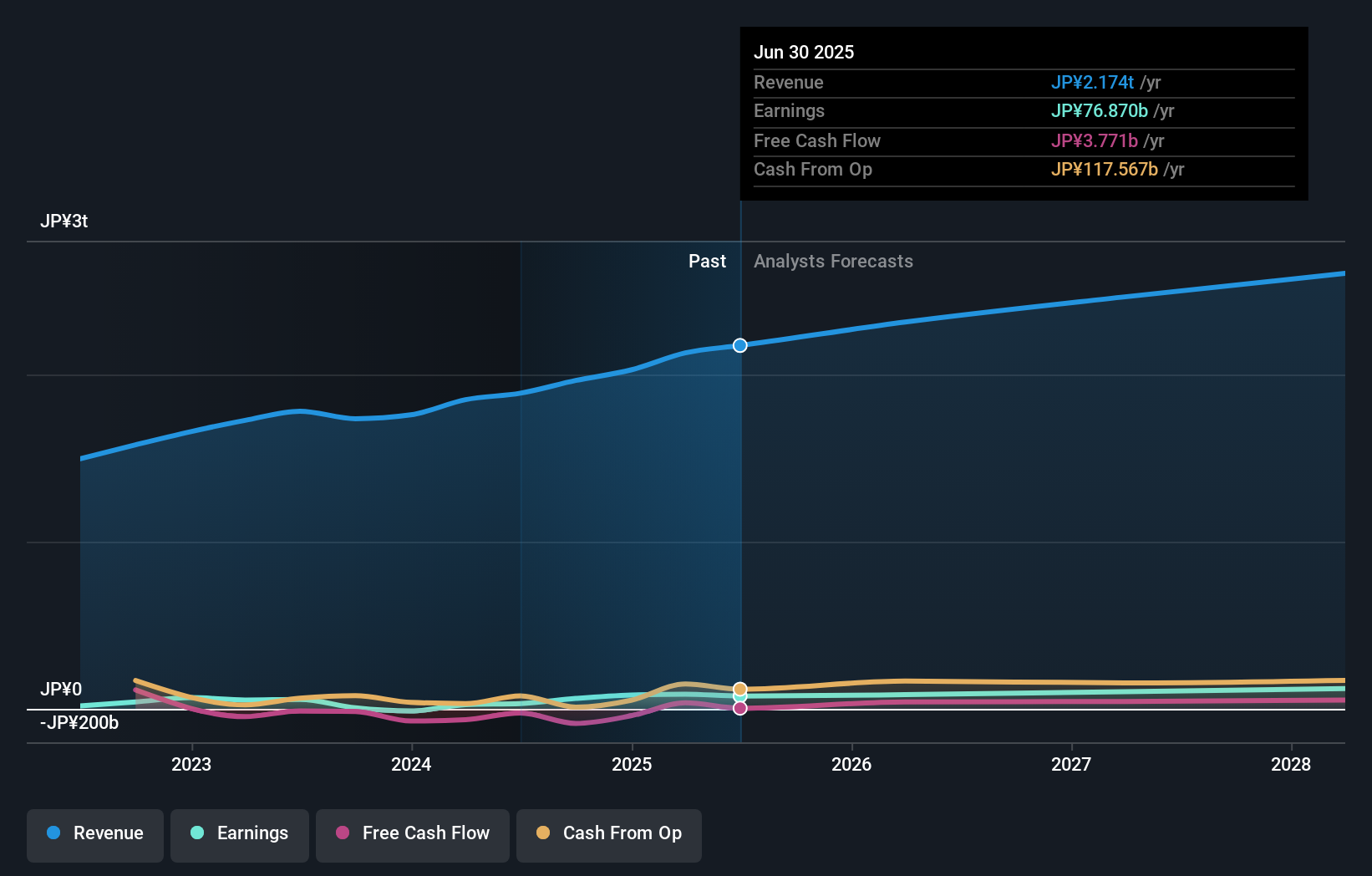Painful week for individual investors invested in Kawasaki Heavy Industries, Ltd. (TSE:7012) after 12% drop, institutions also suffered losses
Key Insights
- Kawasaki Heavy Industries' significant individual investors ownership suggests that the key decisions are influenced by shareholders from the larger public
- A total of 25 investors have a majority stake in the company with 46% ownership
- 44% of Kawasaki Heavy Industries is held by Institutions
If you want to know who really controls Kawasaki Heavy Industries, Ltd. (TSE:7012), then you'll have to look at the makeup of its share registry. And the group that holds the biggest piece of the pie are individual investors with 50% ownership. That is, the group stands to benefit the most if the stock rises (or lose the most if there is a downturn).
While institutions, who own 44% shares weren’t spared from last week’s JP¥234b market cap drop, individual investors as a group suffered the maximum losses
Let's delve deeper into each type of owner of Kawasaki Heavy Industries, beginning with the chart below.
See our latest analysis for Kawasaki Heavy Industries

What Does The Institutional Ownership Tell Us About Kawasaki Heavy Industries?
Many institutions measure their performance against an index that approximates the local market. So they usually pay more attention to companies that are included in major indices.
As you can see, institutional investors have a fair amount of stake in Kawasaki Heavy Industries. This can indicate that the company has a certain degree of credibility in the investment community. However, it is best to be wary of relying on the supposed validation that comes with institutional investors. They too, get it wrong sometimes. It is not uncommon to see a big share price drop if two large institutional investors try to sell out of a stock at the same time. So it is worth checking the past earnings trajectory of Kawasaki Heavy Industries, (below). Of course, keep in mind that there are other factors to consider, too.

Hedge funds don't have many shares in Kawasaki Heavy Industries. The company's largest shareholder is BlackRock, Inc., with ownership of 5.3%. For context, the second largest shareholder holds about 5.1% of the shares outstanding, followed by an ownership of 3.8% by the third-largest shareholder.
Our studies suggest that the top 25 shareholders collectively control less than half of the company's shares, meaning that the company's shares are widely disseminated and there is no dominant shareholder.
Researching institutional ownership is a good way to gauge and filter a stock's expected performance. The same can be achieved by studying analyst sentiments. There are a reasonable number of analysts covering the stock, so it might be useful to find out their aggregate view on the future.
Insider Ownership Of Kawasaki Heavy Industries
The definition of company insiders can be subjective and does vary between jurisdictions. Our data reflects individual insiders, capturing board members at the very least. The company management answer to the board and the latter should represent the interests of shareholders. Notably, sometimes top-level managers are on the board themselves.
Most consider insider ownership a positive because it can indicate the board is well aligned with other shareholders. However, on some occasions too much power is concentrated within this group.
Our information suggests that Kawasaki Heavy Industries, Ltd. insiders own under 1% of the company. It is a very large company, so it would be surprising to see insiders own a large proportion of the company. Though their holding amounts to less than 1%, we can see that board members collectively own JP¥967m worth of shares (at current prices). Arguably recent buying and selling is just as important to consider. You can click here to see if insiders have been buying or selling.
General Public Ownership
The general public -- including retail investors -- own 50% of Kawasaki Heavy Industries. This level of ownership gives investors from the wider public some power to sway key policy decisions such as board composition, executive compensation, and the dividend payout ratio.
Next Steps:
I find it very interesting to look at who exactly owns a company. But to truly gain insight, we need to consider other information, too. Consider for instance, the ever-present spectre of investment risk. We've identified 2 warning signs with Kawasaki Heavy Industries (at least 1 which shouldn't be ignored) , and understanding them should be part of your investment process.
If you are like me, you may want to think about whether this company will grow or shrink. Luckily, you can check this free report showing analyst forecasts for its future.
NB: Figures in this article are calculated using data from the last twelve months, which refer to the 12-month period ending on the last date of the month the financial statement is dated. This may not be consistent with full year annual report figures.
Valuation is complex, but we're here to simplify it.
Discover if Kawasaki Heavy Industries might be undervalued or overvalued with our detailed analysis, featuring fair value estimates, potential risks, dividends, insider trades, and its financial condition.
Access Free AnalysisHave feedback on this article? Concerned about the content? Get in touch with us directly. Alternatively, email editorial-team (at) simplywallst.com.
This article by Simply Wall St is general in nature. We provide commentary based on historical data and analyst forecasts only using an unbiased methodology and our articles are not intended to be financial advice. It does not constitute a recommendation to buy or sell any stock, and does not take account of your objectives, or your financial situation. We aim to bring you long-term focused analysis driven by fundamental data. Note that our analysis may not factor in the latest price-sensitive company announcements or qualitative material. Simply Wall St has no position in any stocks mentioned.
About TSE:7012
Kawasaki Heavy Industries
Engages in aerospace systems, vehicles, energy solutions and marine, precision machinery, and robot businesses in Japan and internationally.
Solid track record with adequate balance sheet.
Similar Companies
Market Insights
Community Narratives



